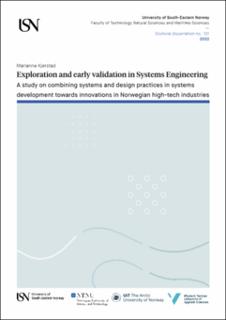Exploration and early validation in Systems Engineering: A study on combining systems and design practices in systems development towards innovations in Norwegian high-tech industries
Doctoral thesis
Published version
Permanent lenke
https://hdl.handle.net/11250/2984753Utgivelsesdato
2022Metadata
Vis full innførselSamlinger
Sammendrag
This thesis on exploration and early validation in Systems Engineering focuses on
engineering practices towards high-tech innovations in the early systems development
phase. It looks towards systems and design approaches to characterize and employ a
framework supporting systems engineers in defining the problem to be addressed and
the iterative creation of systems concepts to resolve these issues.
The evolving technology enables systems that interact and intervene with people and
organizations more complexly than ever before. Consequently, the high-tech industry
faces a rapidly changing market need and systems with increasing socio-technical
complexity. The industry needs rapid adaptation to change to stay competitive. Staying
ahead of competitors and providing significant innovative solutions are essential for the
industries’ business value. In recent years, the literature has proposed combining
systems and design approaches to cope with real-world problems in systems
development towards innovations. However, the literature on practices to support this
combination is still young. As a result, there is a knowledge gap of a practical framework
to achieve this.
This thesis presents research conducted as part of a research collaboration project with
four Norwegian high-tech companies and two academic partners within Systems
Engineering and Systems Oriented Design. The research collaboration project aimed to
establish a combined systems and design framework for the industry partners to achieve
significant innovations. The industry context of this thesis is within the business domains
of the four industry partners, primarily focusing on the early systems development of a
large-scale renewable energy system for operation in ocean space. This thesis also
includes results from researching engineering practices in early systems development of
product innovations in land-based industries such as chemical and demolishing plants.
The thesis is article-based and consists of four independent and interlinked studies using
mainly qualitative research methods. The four appended articles present the four
studies. Articles 1 and 2 are part of an initial explorative study to clarify research goals and questions and gain insight into engineering practices and challenges through two
industry cases. Article 3 analyzes ten industry cases exploring engineering practices from
systems and design approaches and identifies industry needs and success criteria for a
combined framework. Furthermore, Article 4 builds on the findings from Article 3 and
employs the success criteria in a 2-year longitudinal industry case to synthesize a
practical method. Finally, Article 4 evaluates the method in an industrial setting to gain
insight into the main challenges in applying this way of working and provide a basis for
further research.
This thesis contributes to the Systems Engineering body of knowledge by gaining insight
into the industry needs for a combined systems and design framework in the early
systems development phase. The thesis identifies the characteristics of a framework and
broadens the theoretical understanding of how such a framework supports the
engineering practices towards high-tech innovation. Furthermore, the thesis proposes
a practical method to guide the systems engineers in employing the framework and
indicates potential challenges and lack of system engineers’ skills to practice this way of
working.
Består av
Article 1: Kjørstad M., Falk K., Muller G., Pinto J. (2019). Early Validation of User Needs in Concept Development: A Case Study in an Innovation-Oriented Consultancy. In: Ahram T, Karwowski W, Taiar R, eds. Human Systems Engineering and Design. IHSED 2018. Advances in Intelligent Systems and Computing, vol 876. Springer, Cham, 54-60. doi: 10.1007/978-3-030-02053-8_9Article 2: Kjørstad, M., Mansouri, M., Muller, G., Kjenner, S. (2019). Systems Thinking for Early Validation of User Needs in the Front End of Innovation; a Case Study in an Offshore SoS. Systems of Systems Engineering Conference SOSE 2019. doi: 10.1109/SYSOSE.2019.8753865
Article 3: Kjørstad M., Falk K., Muller G. (2020). Exploring a Co-Creative Problem Solving Toolbox in the Context of Norwegian High-Tech Industry. IEEE Systems Journal. doi:10.1109/JSYST.2020.3020155
Article 4: Kjørstad, M., Muller, G., Falk, K. (2021). Co-Creative Problem Solving to Support Rapid Learning of Systems Knowledge towards High-Tech Innovations: A Longitudinal Case Study. MDPI Systems Journal, 9(2):42. doi: 10.3390/systems9020042
Utgiver
University of South-Eastern NorwaySerie
Doctoral dissertations at the University of South-Eastern Norway;121Opphavsrett
© The Author, except otherwise stated
Med mindre annet er angitt, så er denne innførselen lisensiert som http://creativecommons.org/licenses/by-nc-sa/4.0/deed.en
Beslektede innførsler
Viser innførsler beslektet ved tittel, forfatter og emneord.
-
Integrating Process Standards for System Safety Analysis to Enhance Efficiency in Initial Airworthiness Certification of Military Aircraft: A Systems Engineering Perspective
Guldal, Morten Reinfjord; Andersson, Jonas Carl Martin (Peer reviewed; Journal article, 2020)When designing an aircraft, a System Safety Analysis (SSA) is an important part of the systems engineering activities related to initial airworthiness certification. For military aircraft, this requires not only a process ... -
Transient stability of fault ride through capability of a transmission system of a distributed hydropower system
Manjula, Edirisinghe V. P. J.; Øyvang, Thomas; Hegglid, Gunne John (Journal article; Peer reviewed, 2017)This paper describes the Fault Ride Through (FRT) capability of generators of a part of the 132 kV high voltage power network in Telemark region, Norway using a simplified power system simulator model. The organization, ... -
Experiences from Teaching Master level Course in Research Methods in Systems of Systems Engineering
Kokkula, Satyanarayana (Satya); Muller, Gerrit; Syverud, Elisabet; Falk, Kristin (Chapter, 2020)The paper summarizes the challenges and experiences from a course in research methods for systems engineering master's students. This course is a preparatory course for the final master's project. Each student selects a ...

